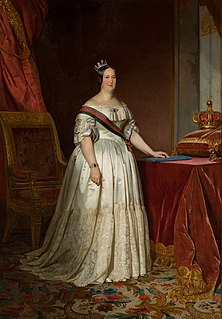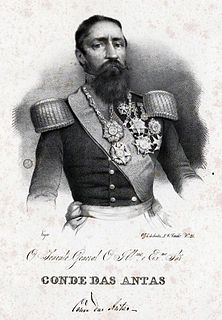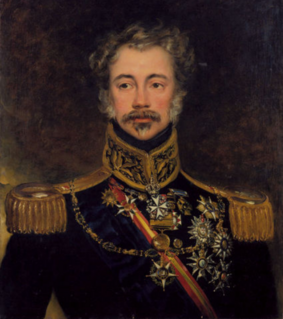Related Research Articles

The Liberal Wars, also known as the Portuguese Civil War, the War of the Two Brothers or Miguelite War, was a war between liberal constitutionalists and conservative absolutists in Portugal over royal succession that lasted from 1828 to 1834. Embroiled parties included the Kingdom of Portugal, Portuguese rebels, the United Kingdom, France, the Catholic Church, and Spain.

DonaMaria II "the Educator" or "the Good Mother", reigned as Queen of Portugal from 1826 to 1828, and again from 1834 to 1853. Born in Rio de Janeiro, she was the first child of Emperor Pedro I of Brazil and of his first wife, Empress Maria Leopoldina, and thus a member of the House of Braganza. One of the two surviving children born when Pedro was still heir apparent to Portugal, she inherited Portuguese titles and was placed in the line of succession to the former Portuguese throne, even after becoming a member of the Brazilian Imperial Family, from which she was excluded in 1835 after her definitive ascension to the Portuguese throne.

DomMiguel I, nicknamed The Absolutist, The Traditionalist and The Usurper, was the King of Portugal between 1828 and 1834, the seventh child and third son of King João VI (John VI) and his queen, Carlota Joaquina of Spain.

The Most Serene House of Braganza, also known as the Brigantine Dynasty, is a dynasty of emperors, kings, princes, and dukes of Portuguese origin which reigned in Europe and the Americas.

The military history of Portugal is as long as the history of the country, from before the emergence of the independent Portuguese state.

José Lúcio Travassos Valdez, only Baron and first Count of Bonfim, was a Portuguese soldier and statesman.

The Battle of Cape St. Vincent was a naval encounter off Cape St. Vincent between a Liberal fleet under the command of British naval officer Charles Napier against a Miguelite fleet under the command of Portuguese naval officer Manuel Marreiros, which was fought on 5 July 1833 during the Liberal Wars and resulted in a decisive victory for the Liberal fleet. Over the course of the battle, the Liberal fleet, despite being significantly outnumbered by the Miguelite fleet and lacking any ships of the line compared to the Miguelite four, managed to close with the Miguelites, board their ships and engage in hand-to-hand combat. The early exchange of cannon fire between the two fleets went on for some time before Napier decided that his numerically inferior squadron could not last long against the Miguelite fleet, and sailed his ships directly towards the Miguelite fleet.

This is a historical timeline of Portugal.

The history of the kingdom of Portugal and the Algarves, from the First Treaty of San Ildefonso and the beginning of the reign of Queen Maria I in 1777, to the end of the Liberal Wars in 1834, spans a complex historical period in which several important political and military events led to the end of the absolutist regime and to the installation of a constitutional monarchy in the country.

Luís da Silva Mouzinho de Albuquerque was a Portuguese military officer, engineer, poet, scientist and politician, who distinguished himself during the Liberal Wars and in the conflicts that marked Portugal's history in the first half of the 19th century. He served as the Minister of the Kingdom during the liberal regency of Pedro of Braganza. This was the most prominent post inside the government at that time, which made him the Prime Minister of Portugal in all but name. He was also several times minister and deputy minister during the Constitutional Monarchical period. Among other offices, he served as Chief of the National Mint, captain-general and governor of Madeira, and inspector-general of public works. He was the grandfather of Joaquim Augusto Mouzinho de Albuquerque, a military officer and colonial administrator.

The Liberal Revolution of 1820 was a Portuguese political revolution that erupted in 1820. It began with a military insurrection in the city of Porto, in northern Portugal, that quickly and peacefully spread to the rest of the country. The Revolution resulted in the return in 1821 of the Portuguese Court to Portugal from Brazil, where it had fled during the Peninsular War, and initiated a constitutional period in which the 1822 Constitution was ratified and implemented. The movement's liberal ideas had an important influence on Portuguese society and political organization in the nineteenth century.

Porto is the second largest city in Portugal behind the capital, Lisbon.

The Battle of Ponte Ferreira, fought on 22–23 July 1832, was the first major battle of the Portuguese Civil War between the forces of Dom Pedro, ex-Emperor of Brazil and Regent for his daughter Maria da Glória, and the army of his brother Dom Miguel, who had usurped the throne of Portugal. Though technically a victory for Pedro's forces, it gave him no lasting advantage because the enemy were not pursued and were able to return in full strength, as a result of which he was besieged in Porto for an entire year.

Francisco Xavier da Silva Pereira, 1st Count of Antas was a Portuguese nobleman and a leading soldier of the period of the Liberal Wars.

João Carlos Gregório Domingos Vicente Francisco de Saldanha Oliveira e Daun, 1st Duke of Saldanha, was a Portuguese marshal and statesman.

Diogo Antônio Feijó was a Brazilian politician and catholic priest. He was the Regent of the Empire of Brazil from October 1835 to September 1837. Beside members of the Imperial family, he was the first to ever hold this position alone; the other was his appointed successor after his resignation, the Marquis of Olinda. Both were regents at the time Emperor Dom Pedro II was still a minor.

The Battle of the Tagus was a naval engagement that took place on 11 July 1831 at the mouth of the Tagus river, in Portugal. A French fleet attacked and subdued Portuguese fortifications at the entrance of the Tagus, with the aim to strong-arm the government of Miguel I into recognising the newly established Kingdom of the French. The damage to the forts defending access to the Tagus and the arrival of French warships at Lisbon forced the Portuguese to cave in and comply with French demands.

The Castle of Almada is a medieval castle located in the civil parish of Almada, Cova da Piedade, Pragal e Cacilhas, in the municipality of Almada, Portuguese Setúbal.

The landing at Mindelo was a landing of Portuguese Liberal forces near Mindelo North of Porto on 8 July 1832, and turning point in the Liberal Wars.
The Battle of Cova da Piedade, or Battle of Cacilhas or Battle of Almada, fought on 23 July 1833, was a battle of the Portuguese Civil War between the Liberal forces of Dom Pedro, ex-Emperor of Brazil and Regent for his daughter Maria da Glória, and the Absolutist army of his brother the King Dom Miguel. The Liberal forces were victorious and occupied Lisbon the next day.
References
- ↑ "Belfastada". Infopedia. Retrieved 21 August 2016.